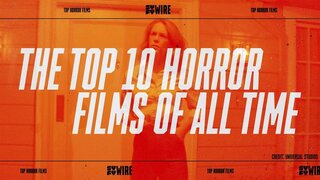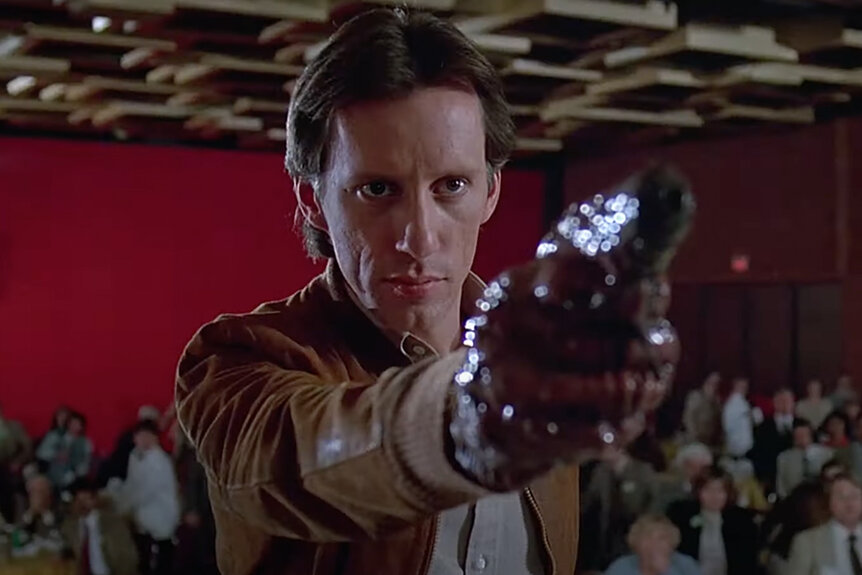Create a free profile to get unlimited access to exclusive videos, sweepstakes, and more!
40+ Years Later, Videodrome Is Still a Viscerally Entertaining Horror Classic
Let's look back at one of David Cronenberg's best films, now streaming on Peacock.
From the outside looking in, few horror films appear more dated than Videodrome, David Cronenberg's 1983 classic about a cynical TV programmer (James Woods) who stumbles upon an unspeakably violent pirate channel, and digs into the conspiracy behind it. After all, this is a film devoted to the art of low-rent television in the 1980s, a film full of VHS and Beta-Max tapes, references to cathode rays, and cabinet-style televisions that almost look like alien technology compared to the flat-screens of today. It would be easy for a jaded aspiring horror addict to glance at this film and scoff, dismissing it as a relic.
Why now is a great time to revisit David Cronenberg's Videodrome
But there's an undeniable timelessness, and a resilient terror, lurking in Cronenberg's film, which is currently streaming on Peacock. That same timelessness is in just about everything he's ever done, but it's especially impressive here, in a film steeped so deeply in the glories of strange VHS footage, the static glow of TV screens, and the quiet comfort of keeping the tube on while you're wandering around the house. If you're of the right mindset, it's retro fun, but there's more to its appeal than that. Look closer, and you'll find a deeply impactful, viscerally entertaining piece of body horror that appeals to both old-school VHS devotees like me and young viewers who've never held a video cassette in their lives.
RELATED: David Cronenberg's Scanners Has More to Offer Than Just an Exploding Head
That begins with Woods as Max, a guy you know even if he does feel like a product of his time. Max eats, sleeps, and breathes television, even if he shrugs off his professional goals as the kind of thing he simply has to do for the survival of his station. He's a guy who uses the TV as a wake-up call, who chews pizza crusts rather than going for a decent meal, who takes every leg-up he can in the world, up to and including swiping items from room service trays in hotel corridors. He also understands, intimately, the audience to which he's catering. They're people who don't pay attention enough to watch a show in linear order, who don't necessarily care about quality or origins or even necessarily morals, as long as they get their fix of sex and violence.
Which of course, brings him to Videodrome, a mysterious and violent TV program that hooks him from the moment he first sees it. In this show –– simply a domineering red room in which people are continuously and brutally tortured –– Max sees his next hit, but he'll have to go to great lengths to get it. Videodrome, you see, is dangerous, not just a show but a real feed of brutality... or maybe it's something else entirely. Maybe it's whatever Max wants it to be.
The thematic concerns laid out through this plot –– the allure of violence in our culture, the addictive nature of entertainment, the cynicism of showbusiness –– are all things we can relate to and grasp easily now, even if the technology has changed. We live in the age of algorithms, after all, of cold marketing decisions made based on how many viewers a show or film might retain in the first five minutes. The debates about sex and violence in films and shows are debates we're still having now, and the nature of our brains in relationship to the "content" we consume is of course something we're still all intimately studying, even if we don't realize it.
So we've got a timeless character, and a timeless set of themes, all wrapped up in Cronenberg's wonderfully dread-inducing sense of pacing and Rick Baker's unforgettable visual effects. That's enough to make Videodrome worth following, but it's not the end of the story. For me, the enduring appeal of Videodrome runs deeper, into the almost mystical approach Cronenberg takes to the material.
RELATED: 25 Essential Horror Films from Peacock's Massive New Halloween Drop
See, this could have been a straightforward body horror that's simply about the ways in which TV mutates us, warps us, and creates new outgrowths of our physical form. And it certainly has all of those elements working for it. But then Videodrome goes further, inserting religious imagery into the entire affair. Prayer candles, icons of Saints, crucifixes, even the very idea of charity for the less fortunate are all infused not just into the more overt religious scenes, but into just about every scene. There are layers and layers of it, more emerging all the time, and the more you watch the film, the more Cronenberg's perspective starts to sink in for you, the more mesmeric the film becomes. On top of that, it occurs to you as you're watching, and watching again, and again, that the themes of the film are starting to creep into your experience as a viewer.
After all, if Videodrome is right, and what you watch is a key piece of your reality, how much of your reality is starting to become the film? It's a creepy notion, one backed up by the careful, detailed way in which the film is laid out by the hands of the master, and it makes the film all the more enduring.
And that's before we even talk about the great Deborah Harry.
Videodrome is now streaming on Peacock.
Originally published Oct 6, 2023.































